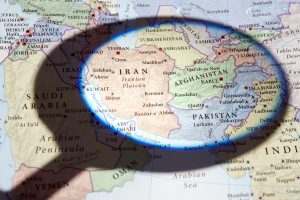On August 5, Seyed Mahdi, a hearing-impaired Afghan teenager, was allegedly beaten and tortured by Iranian police, after being detained for deportation to Afghanistan. A video circulated on social media showing an Iranian police officer pinning Mahdi to the ground, pressing his knee into the boy’s neck, as he struggled to breathe. The incident sparked widespread reactions on social media and among Afghan politicians and officials. Afghan social media users all over the world launched the “Get Your Knee Off My Neck” campaign, harshly criticizing Iran’s treatment of Afghan migrants.
Neither the Taliban nor the Iranian government reacted to the incident.
In the first five months of 2024, nearly 400,000 Afghans have been deported from Iran and Pakistan, the Taliban said in early June. The lion’s share – almost 75 percent – came from Pakistan. The Taliban’s statement was accompanied by a meek request to not treat Afghans harshly. Both Tehran and Islamabad, however, have paid no attention to such mild rhetoric. In Iran in particular, physical harassment and deportations of “undocumented” Afghans have picked up since June, after the death of an Iranian in eastern Tehran, in which Afghan migrants were allegedly involved. In July, in Iran’s Fars province, six Afghans were left bloodied after being attacked by unidentified men.
In December 2023, an Afghan diplomat – the first secretary in the Afghan consulate in Mashhad – was expelled by Iran, after he assaulted an Iranian photographer. In a delayed response, in July 2024, the Taliban declared a senior Iranian diplomat Ali Mojani “persona non grata” for having “overstepped his boundaries.” Mojani, an advisor to Iran’s special representative for Afghan affairs, had asked permission to join the Eid al-Adha prayers led by Taliban chief Mullah Hibatullah Akhundzada in Kandahar.
In recent months, security forces of both countries have clashed, resulting in deaths, over the sharing of Helmand River water and Iranian public figures have raised questions regarding the legitimacy of the Taliban regime.
While this can be seen as a growing acrimony between the two nations, ascending to a height of no return, the underlying mutual dependencies and the evolving geopolitics in the region have forced the two sides to avoid crossing red lines.
One-third of Afghanistan’s imports are sourced from Iran. The Taliban regime wants to deepen economic relations even further. In December 2023, Taliban Foreign Minister Amir Khan Muttaqi visited Iran and asked Iranian traders “to seize the opportunities present in the Afghan market.” Muttaqi emphasized Afghanistan’s agricultural potential, fertile soil, clean water, and valuable mines, highlighting the mutual benefits of investments from neighboring countries like Iran. Muttaqi’s was a follow-up visit after the May 2023 visit by a 30-member Taliban delegation to Tehran led by Deputy Prime Minister Abdul Ghani Baradar that sought to strengthen bilateral economic relations.
The Taliban also have shown immense interest in the Chabahar port project that will allow the landlocked country access to Asian as well as European markets. In February 2024, a technical delegation from Afghanistan visited the Chabahar Free Trade Zone and offered an investment of $35 million in the project.
Even on the water-sharing conflict, which is seemingly intractable, both sides have bitterly squabbled in the dry months and kept silent when there is excess water. Typically anti-Taliban statements are issued by Iranian authorities in April and May, which are water-scarce months, and are eased out subsequently. For instance, in April 2024, an Iranian environmental official accused the Afghan Taliban of intentionally diverting Helmand waters and preventing them from flowing naturally into Sistan and Baluchestan province. Previously, in May 2023, Iran’s then-President Ebrahim Raisi threatened the Taliban to release water, or else telling them to “not complain later” about impending Iranian actions. While no follow-up actions were taken, the Taliban refused to cooperate, saying that it follows the 1973 treaty that commits Afghanistan to allow 22 cubic meter of water per second into Iran. However, the Taliban pointed to climate change, reduced precipitation and drought conditions are responsible for the lower amount of water in the river.
And yet, the war in Gaza and the escalating tension between Israel on the one hand and Iran and Lebanon on the other has necessitated that the new Iranian government led by President Masoud Pezeshkian keeps the eastern borders with Afghanistan tension-free. Moreover, Iran’s global isolation also means that it seeks to gather as much support and cooperation as possible where it can, including that of the Taliban. A structured strategic bonhomie is in the cards.
In June 2024, Iranian Foreign Minister Ali Bagheri Kani dialed his Afghan counterpart Muttaqi to discuss potential joint action against Israel. Previously, on April 2, Muttaqi had issued a statement condemning the Israeli strike on the Iranian mission in Damascus. In the same months, the Taliban Foreign Ministry supported Iranian drone attacks on Israel, terming it an act of self-defense. It is unlikely that the Taliban would directly get involved in the widening Gaza conflict, but its moral support for Iran would be a boost for Tehran.
Pezeshkian has promised to prioritize and improve relations with Iran’s neighboring countries. However, it remains to be seen if this wartime compulsion of ignoring or only nominally addressing the irritants in Afghan-Iranian relations will last beyond the current phase of regional uncertainty or will cascade into a major conflict.
































